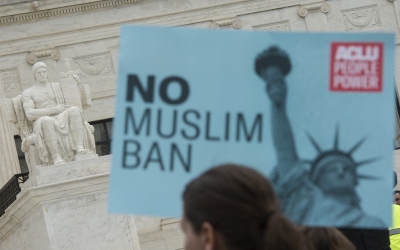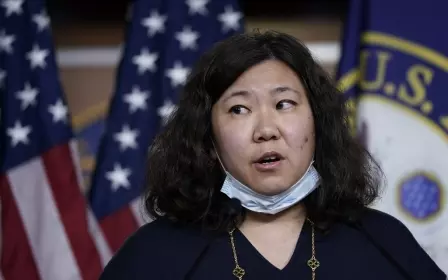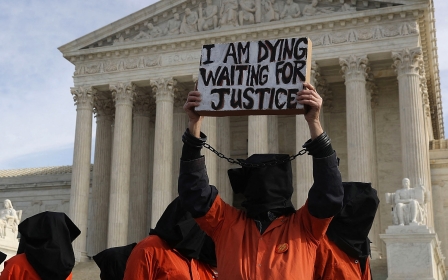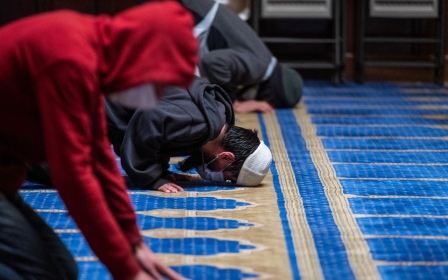US Muslims react to Biden's nomination of first Muslim woman to be federal judge

Muslims across the United States are celebrating President Joe Biden’s judicial nomination of Nusrat Choudhury, who, if confirmed by the Senate, will be the first Muslim woman to be appointed as a US federal judge.
Choudhury, a Bangladeshi American among the eight nominees announced by the White House on 19 January, is the legal director of the American Civil Liberties Union (ACLU) of Illinois, a position she has held since 2020. Before that, she served as the deputy director of the national ACLU’s racial justice programme, following a stint as a senior staff attorney for the organisation's national security project, and was a Marvin M Karpatkin Fellow.
In 2020, leading Democrats called on Biden to appoint Muslim federal judges if he were to be elected.
Making the request in a letter at the time, House Representative Grace Meng wrote: "The judiciary today does not reflect the America it presides over. As of 2020, there is to our knowledge no appointed member of the federal judiciary who identifies as Muslim, nor has there ever been."
There are currently 890 federal judges, and, if confirmed, Choudhury will be a judge in the District Court for the Eastern District of New York and the second Muslim judge on the federal bench. However, American Muslims argue that this would still not be enough.
The US federal judicial system decides the constitutionality of federal laws and resolves disputes regarding these laws.
Talk of the town
Choudhury's over a decade-long commitment to fighting for civil liberties and justice for all has been the talk of the town.
To many, one of the most notable roles of Choudhury's career was when she was the litigator in the Raza v. City of New York lawsuit against the NYPD’s unjust surveillance and profiling of Muslims.
Last year, Choudhury, along with 78 religious, civil and community organisations, fought for the Chicago police board to fire John Catanzara, an officer who made anti-Muslim statements. The officer eventually faced a disciplinary hearing and resigned a day later.
'She has spent her entire professional life in the trenches with the community, fighting for civil rights'
- Eric Naing, Muslim Advocates
Choudhury has long been an outspoken critic on the frequency of unarmed Black men being killed in America, writing in 2014 that it happens too often and that there needs to be a comprehensive ban on racial profiling.
She also challenged the No-Fly List of the US government, a database that government agencies use to decide who is allowed to board flights. In 2012 Choudhury was the litigator in the first federal lawsuit challenging the No-Fly List procedures.
"More than two years ago, our clients were placed on a secret government blacklist that denied their right to travel without an explanation or chance to confront the evidence against them," Choudhury said in a statement at the time.
"The Constitution requires the government to provide our clients a fair chance to clear their names and a court will finally hear their claims.”
Eric Naing, the communications director at Muslim Advocates, believes Muslims should be celebrating this nomination "whole-heartedly".
"Nusrat has spent her whole career defending the civil rights of Muslim communities and other marginalised communities," Naing told Middle East Eye.
"She would break barriers as the first Muslim woman and Bangladeshi American federal judge, but maybe more importantly, she has spent her entire professional life in the trenches, with the community, fighting for civil rights."
In July 2021, Muslim Advocates sent a letter to Senator Chuck Schumer urging him to recommend Choudhury as a federal judge, which he eventually did.
MEE has reached out to the ACLU to speak with Choudhury but was told she is not able to speak publicly during the pendency of the nomination in the Senate.
"Nusrat Choudhury’s nomination to the federal bench is historic...During her tenure as legal director in Illinois, she has among other things led our legal team in efforts to improve policing in Chicago, protect medically-vulnerable persons detained on immigration charges during the COVID pandemic in Illinois county jails, and challenged unfair practices that drive Chicago residents into bankruptcy to pay fines and fees," the ACLU released in a statement.
'A welcomed addition'
Choudhury's nomination has been received more favourably than when Zahid Quraishi, a former magistrate judge in New Jersey, became the first Muslim to be appointed as a US federal judge last year.
Some American Muslims had questions about Quraishi's professional past as a lawyer for US Immigration and Customs Enforcement (ICE) and as a “detention advisor” while serving in the military during the Iraq war, Slate reported last year.
One of the many people to voice their concerns at the time was Zahra Billoo, a civil rights lawyer and the executive director for the Council on American-Islamic Relations San Francisco.
'Nusrat’s commitment to her community and commitment to justice is to be celebrated and would be a welcomed addition to the bench'
- Zahra Billoo, civil rights lawyer
"There are some grave human rights violations that have happened on America’s watch over and over again for many, many years. The extent that it’s possible he participated in some of them, or gave legal advice to some of them, we want to know," she told Slate.
Billoo, however, feels excited about Choudhury’s nomination, saying that Choudhury has committed her career to public service and has taken on very difficult fights.
"This…news should be championed. Nusrat’s commitment to her community and commitment to justice is to be celebrated and would be a welcomed addition to the bench," Billoo told MEE.
"At the same time, she is just one judge in a centuries-old system that, from its inception, has persecuted people of colour, poor people and political dissidents.
"And so while this is so exciting, it is hopefully the first of many needed steps."
Similarly, Sahar Aziz, a law professor and founding director of the Center for Security, Race and Rights at Rutgers University, believes that while the nomination is great news, it is not enough to change the flawed US judicial system.
"[Quraishi] was a prosecutor. He had spent his entire professional life representing the government or large companies," Aziz told MEE.
"Nusrat Choudhury is representative of plaintiffs who bring civil rights cases. She tends to sue the government, advocating against national security policies and practices. And that is quite different in terms of how she has worked with the law and has worked to ensure that the law provides equal protection to everyone."
One-sided view
Government lawyers and former lawyers for large companies are highly overrepresented in the judiciary, she explained, which has caused significant concern within the legal profession that the judiciary has a one-sided view of the efficacy of law or the lack thereof.
According to Aziz, although judges matter significantly, they are just one part of a complex system comprised of multiple stakeholders that include jurors, lawyers and government officials.
She believes that having judges with "diverse professional experiences and diverse personal experiences that are interconnected to their identities is important at a macro level".
'When you have judges that have homogenous experiences personally and professionally, you will structurally produce a judiciary that is lopsided in favour of those experiences and perspectives'
- Sahar Aziz, law professor
"When you have judges that have homogenous experiences personally and professionally, you will structurally produce a judiciary that is lopsided in favour of those experiences and perspectives," Aziz said.
"So with Nusrat Choudhury, I think she counterbalances the trend because she’s a Muslim woman and because she worked most of her career in civil societies specifically in the ACLU," she said, highlighting Choudhury's representation of people affected by post 9/11 laws, policies and practices.
Aziz argued, however, that one judge cannot change the entire system, especially because the power of a judge is limited.
"Ultimately you want a judge who is objective and impartial, but again informed to understand that what may exist on paper isn’t always reflected in the reality, particularly of those groups in society that are less powerful, that are often scapegoated, that are stigmatised," she said.
"And that certainly has been the case for Muslims, Arabs and South Asians for the last 20 years."
Middle East Eye delivers independent and unrivalled coverage and analysis of the Middle East, North Africa and beyond. To learn more about republishing this content and the associated fees, please fill out this form. More about MEE can be found here.





